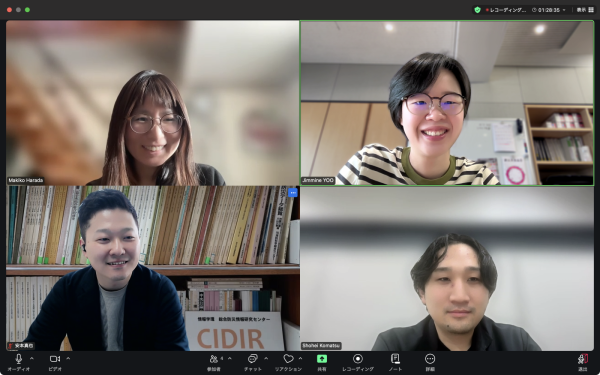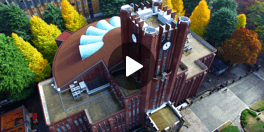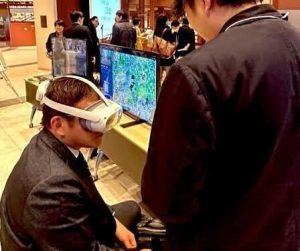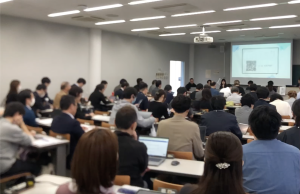
February 27, 2025
オンライン座談会:経験者に聞く「学会運営の裏側」(前編)Online roundtable : Ask the experienced “Behind the Scenes of Academic Society Management”(Part 1)
日本国内には、2,000を超える多様な分野の学会が存在しています。「学会」とは、「それぞれの学問分野で学術研究の進展・連絡などを目的として、研究者を中心に運営される団体。また、その集会」とされています(デジタル大辞泉)。
学会と一概に言っても、その中には事務局運営、研究大会や研究会の企画・実施、論文誌の発行など、さまざまな取り組みがあります。研究の世界では誰もが一度は聞いたことがある学会ですが、実はその「学会」の実態についてはあまり知られておらず、わからないという方が多いのではないでしょうか。
去る12月5日、学会運営の裏方で経験を積んできているメンバーでオンライン座談会を開催し、学会運営の大変さや魅力について聞きました。(ウェブサイト&ニュースレター編集部)
In Japan, there are over 2,000 academic societies across various fields. According to the Digital Daijisen dictionary, an “academic society” is defined as “an organization primarily run by researchers to facilitate academic research progress and communication within a specific field, as well as the gatherings held by such organizations.”
While the term “academic society” is widely recognized in the research world, the actual workings of these societies remain largely unknown to many. Academic societies encompass a variety of operations, including office management, planning and hosting research conferences, and publishing academic journals.
To shed light on the behind-the-scenes work of academic society management, we held an online roundtable discussion on 5th December, with members who have hands-on experience in this field. They shared insights into both the challenges and rewards of managing academic societies.(Website & Newsletter Editorial Team)
[English text will follow the Japanese text]
【参加者紹介(所属・学年は2024年12月5日時点)】
- 小松尚平さん:先端表現情報学コース博士課程。人文科学系の学会で研究大会に実行委員として活動。
- 安本真也さん:情報学環特任研究員。防災系の学会で大会委員会や編集委員会の委員として活動。
<ウェブサイト&ニュースレター編集部>
- 原田真喜子(兼司会):情報学環特任助教。人文科学系の学会で大会実行委員や部会の事務局として活動。
- 柳 志旼:社会情報学コース博士課程。社会学系の学会で事務局として活動。
原田:プロジェクトでお世話になっている先生からのお声がけでした。最初は学会の部会の事務局に入り、その後大会実行委員会へのお声かけがありました。部会の事務局では、オンラインイベントの運営を担当しており、登壇者との連絡、HP更新、当日の運営、動画編集などアーカイブ配信手配などを担っています。今年からはイベントの開催頻度が減り、業務量は減りましたが、それでも気を使うことが多いです。大会実行委員会は毎年変わるので、来年度はどうなるかわかりません。
柳:修士のときからお世話になっている先生からのお声がけでした。私は社会学系の学会の事務局を1年半ほど担当しています。広報担当として、メルマガ配信やウェブサイトの更新などを行っています。この学会は2年ごとに執行部が総入れ替えになるため、事務局もそのタイミングで交代します。毎週メルマガを発行するのは大変ですが、広報を通じて学会の発展に貢献できるのがやりがいです。
安本:学部時代に授業の先生から学会発表を勧められたのがきっかけでした。その後、東大で学会が開催されるタイミングで大会実行委員会に入り、そのあとは大会委員会のメンバーとして継続的に関わるようになりました。特に大会直前の期間は、多くの時間を学会業務に割いています。
また、最近は査読業務も担当しており、編集委員会で査読の取りまとめなどを行っています。
小松:原田さんと同じく、プロジェクトでお世話になっている先生からのお声がけで大会実行委員になりました。今回が初めての学会運営の参加だったのですが、予算管理などの会計関連の業務に携わっており、起業経験や企業中心のカンファレンスの運営経験を活かして、学会運営の最適化やAIを使って作業を簡略化することなどにも貢献しました。
小松・原田・安本:ないです(笑)
安本:ボランティアか、外部委託で業務負担を減らすというところもあると思います。
柳:学生だけ報酬が出るところがありました。
原田:大会中の学生アルバイトは報酬が出ますよね。外部委託するなら私やりますと思うタイミングありませんか?
安本:企画から始まりコーディネート全般ができる会社作れるのでは?と思っています。懇親会の手配まで完璧にできると思います(笑)
安本:委員会によっては「最初は見て学ぶ」姿勢です。大会を行う時はきちんとしたマニュアルを作っていて、イベント専門のフォーマットを活用して管理しています。また、私の頭に全体像があり、当日スタッフには「マニュアルを見て頑張って」と言っています。当日は現場力ですね。
小松:誰がどこの担当なのかを全て理解している人がいなくて、全体像を掴むことが大変でした。企業ではnotionなどでまとめますが、学会ごとに作法が異なるのでなかなか導入は進まないです。
安本:忙しい先生はメールも見られないですからね。Zoomでその場で決めて、あとは学会本番でとなってしまいますよね。
小松:結局は現場力ですね。
柳・小松:身分が学生なので査読には関わっていないです。
安本:満期退学したあと研究員になったのですが、そのタイミングですぐに査読の話がきました。学生でなくなった途端です。査読者をやると、どのような論文が通ってどのような論文が落ちるかわかるようになるのと、読みにくいところを客観的にわかるので、自分の論文を見直すという点でも良いと思っています。文理融合分野の学会の査読編集委員では、誰に査読してもらうというかという差配が複雑で、人を知っていないと難しいところはあります。
原田:部会の事務局を2人で運営しながら、活動に参加し、毎回50〜60人程度が参加するオンラインイベントを開催しています。事務局業務は外部に委託せず、完全に自分たちで運営しています。ホームページ管理から運営まで、全部ゼロから立ち上げました。私が体調を崩したり、日程を忘れてしまうとセミナー自体が開催できなくなるというプレッシャーがあります。
柳:事務局はいま4人体制で運営しています。それぞれ担当がいて、私はその中でも広報担当ということになります。先ほども言いましたが、主な業務として毎週学会のメルマガを配信していて、毎週ネタを探すのが大変です。基本的に会員からイベントのお知らせが届くので、それを活用していますが、たまにネタが全くない週もあります。その場合、「メルマガは休んではいけない!」というプレッシャーがあるので(笑)こっちからネタを探しに行くこともあります。また、配信システムにアクセスできるのが私だけなので、もし私が事故に遭ったり連絡が取れなくなったりしたら、学会のメルマガ配信が停止してしまうという心配もあります。
安本:私たちの学会では、学会の会員から成り立っている大会委員会や編集委員会などがメインで活動し、学会事務局はその事務周りをサポートするという形です。事務局業務は外部委託して、ホームページ管理やメールの配信、財務関係の仕事を担ってもらっています。
小松:管理業務は得意ではないので、テクニカルな面を担当することに徹しています。でも、緊急時の対応や現場の調整などは即座に動けるようにしています。また、新しいツールに慣れている世代として、業務を効率化することを積極的に行なっています。例えば、名札の作成作業も以前は職人技のように手作業で行われていましたが、AIを活用してCSVデータから自動生成するシステムを導入しました。こういった新しい技術を導入することで、学会運営がスムーズになり、負担を軽減できるのではないかと思います。
ーー後編へ続きます。
企画:ウェブサイト&ニュースレター編集部
構成:柳志旼(博士課程)
構成・和/英訳:原田真喜子(特任助教)
英語校正:ディビッド・ビュースト(特別専門員)
[ENGLISH VERSION]
Roundable participants (Status as of December 5, 2024):
- Shinya Yasumoto: Project Researcher and member of conference and editorial committees of academic societies in the disaster prevention field.
- Shohei Komatsu: Ph.D. student in the Emerging design and informatics course and an executive committee member for academic conferences in the humanities.
<Website & Newsletter Editorial Team> - Jimmine Yoo: Ph.D. student in the Socio-information and communication studies course and administrative officer for a sociological academic society.
- Makiko Harada (Moderator): Project Assistant Professor and executive committee member and administrator of academic societies in the humanities.
Harada: I was invited by a professor I worked with on a project. Initially, I joined as a member of the administrative office staff of a division group and later became a member of the conference organizing committee. In my role as a division secretary, I manage online events, communicate with speakers, update the website, coordinate event operations, edit videos, and handle archive distribution. Although the event frequency has decreased recently, reducing my workload, there are still many details to manage. The organizing committee changes annually, so I’m unsure of my role next year.
Yoo: A professor I had known since my master’s program invited me to join. I have been working as a member of the administrative office staff for about a year and a half. As a public relations officer, I handle web-newsletter and website updates. This society changes its executive board every two years, and the administrative team rotates accordingly. Sending out a weekly newsletter is challenging, but contributing to the society’s growth through public relations is rewarding.
Yasumoto: My involvement started when my professor in my undergraduate course encouraged me to present at a conference. Later, when a conference was held at the University of Tokyo, I joined the organizing committee and have remained involved ever since. During the lead-up to a conference, I spend a significant amount of time on society-related tasks. Additionally, I now handle peer review tasks as part of the editorial committee.
Komatsu: Like Harada, I was invited by a professor I worked with on a project. This is my first time participating in academic society management. I mainly handle financial and budget-related tasks, leveraging my previous experience in entrepreneurship and organizing industrial conferences. I have also contributed to optimizing conference operations and streamlining tasks using AI.
Komatsu, Harada, Yasumoto: No, we don’t! (laughs)
Yasumoto: Some societies rely on volunteer work, while others outsource tasks to external service providers to reduce the workload.
Yoo: In some cases, only student members receive compensation.
Harada: Student part-time workers during conferences do get paid, right? Sometimes I wish I could outsource my work too.
Yasumoto: I’ve even thought about starting a company that specializes in academic society management, including conference planning and networking event coordination! (laughs)
Yasumoto: Some committees follow a “watch and learn” approach. For conferences, we prepare proper manuals using event management templates. Since I oversee the overall process, I tell on-site staff, “Refer to the manual and do your best!” Ultimately, handling things on-site requires adaptability.
Komatsu: One challenge is that no single person has a complete understanding of all tasks. In businesses, we use tools like Notion to document workflows, but each academic society has its own way of doing things, making standardization difficult.
Yasumoto: Some professors are too busy to even check their emails. Often, decisions are made quickly over Zoom, and then everything comes together at the actual event.
Komatsu: In the end, “on-site problem-solving skills” are important.
Yoo, Komatsu: Since we are still students, we are not involved in peer review.
Yasumoto: As soon as I had completed my coursework and became a research fellow, I was immediately asked to review papers. The moment I was no longer a student, it came to me. Reviewing papers helps you understand what gets accepted and what doesn’t, and also allows you to recognize unclear writing. This has been valuable for improving my own research. In interdisciplinary societies, selecting reviewers can be complex, as knowing the right people is crucial.
Harada: Our division is run by two people, and we organize online events with 50–60 participants each time. We don’t outsource any administrative tasks—we built everything from scratch, from website management to event operations. I am under pressure because the event cannot take place at all if I get sick or forget the schedule.
Yoo: Our administrative team consists of four members, each with specific roles. I handle public relations, mainly by sending out weekly newsletters. Finding content every week is a challenge. Although members sometimes submit event announcements, there are weeks when there’s nothing to share. Since “skipping the newsletter is not an option” (laughs), I actively search for content myself. Also, I’m the only one with access to the distribution system, which is a concern in case something happens to me.
Yasumoto: In our society, the core activities are managed by members of committees such as the conference and editorial committees, while the administrative office mainly provides support. Administrative tasks like website management, email distribution, and financial management are outsourced to external service providers.
Komatsu: I’m not great at administrative tasks, so I focus on technical aspects. However, I make sure I can respond quickly in emergencies and adapt to on-site needs.
As someone familiar with new tools, I actively work on optimizing workflows. For instance, name tag creation used to be a manual task requiring craftsmanship, but I implemented an AI-powered system that automatically generates name tags from CSV data. By incorporating such technologies, we can streamline academic society operations and reduce the workload.
ーーContinued.
Organized by the Website & Newsletter editorial team
Text: Jimmine Yoo (Ph.D. Student)
Text & Translation: Makiko Harada (Project assistant professor)
English proofreading: David Buist (Project Senior Specialist)



